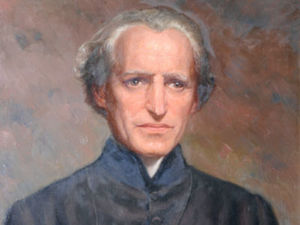 "
"
Confession time: everybody loves awkward freshmen. There’s an element of nostalgia in watching them navigate Notre Dame for the first time – we all remember our first weeks on campus, and if you weren’t also confused by why West Quad is south of South Quad you weren’t doing it right. But this year’s freshmen are doing something no upperclassmen can relate to: the Moreau First Year Experience Course. This new freshmen class is changing the first year experience in a big way, but all most upperclassmen know is that it somehow got freshmen out of taking The Swim Test. So what exactly is the Moreau Course, and why does it exist? A month into fall semester, it’s about time we found out.
The foundations of the course date back to 2011, when a special committee was formed to evaluate the Notre Dame first year experience as a whole. That group drafted a series of recommendations, and a second group was tasked with turning them into reality. Four years later, the Moreau First Year Experience Course was born.
But why change things in the first place? A lot of upperclassmen appear to be personally offended by the loss of the old P.E. model, but Moreau is actually less about replacing P.E. and more about revamping freshmen orientation. Working off the suggestions of that 2011 committee, creators of the course wanted to build an orientation program that extends beyond student’s first few days on campus. The Moreau course does exactly that, and in doing so extends the orientation process into something that is more meaningful for first year students.
At the same time, the class provides an opportunity to address student health more holistically than P.E. did and talk not only about how many minutes you should put on the treadmill, but also how to get better sleep, have healthier relationships and master that infamous stress-management we all wish we had.
The design team worked with people from all walks of campus, and there was plenty of student input – student government, peer leaders and graduating seniors all had their say. The result is 129 sections of a year-long, one-credit class, each composed of less than 20 students. These classes meet weekly, and hold discussions about life on campus, how to stay healthy in the face of all-nighters and SDH brownie bites and some of life’s bigger questions as well. Ideally, everything discussed in the class boils down to the five pillars of a Holy Cross education – mind, heart, zeal, family and hope.
So what do the freshmen think about this new initiative? The reactions are mixed. A common complaint is that there is too much homework: for each week, freshmen are expected to read about 30 pages of material, watch a few short videos and create some sort of written response. Oftentimes this material is never discussed in class, and a lot of freshmen say it feels like busywork. Others appreciate that the class has no tests or quizzes, so there isn’t any “pressure to learn”— they can simply appreciate the material and move on.
Theoretically, every Moreau course should be relatively similar: the homework is identical for every class section, and the discussion topics should stay consistent. However, when talking to freshmen it quickly became obvious that the class varies quite a bit by professor. Some students are jotting down bullet-point lists while others write two page papers; in some classrooms there’s great group discussion about interesting topics, and others feature awkward icebreakers and a never-ending round of the Notre Dame introduction. So while many first years are really enjoying the class, there are still those who aren’t quite sold.
Yet almost all of them can agree on one thing: the Moreau course has been a great way to make friends. The identical weekly assignments provide a convenient talking point when meeting other freshmen, and the seminar-style class itself is conducive to friendly conversation. Classes are grouped by Notre Dame “neighborhoods” — for example, one section would include freshmen from Welsh Family, Ryan, Dillon and Alumni — which gives students an opportunity to interact with people they might see on a regular basis but would otherwise never really get to know. Some of the groups I talked to had already started going to dinner with their classmates or popping in on each other’s tailgates.
The class is still in its infancy, and it’s difficult to tell just yet how the Moreau First Year Experience will change the Notre Dame landscape. Going forward, course creators hope that the class will help the Notre Dame student body be more conscious of the community and their place in it; that it will foster a group of students who are healthy in mind, body and spirit, and are not only more prepared themselves for life’s challenges, but more willing and able to help others prepare themselves. “I’m hopeful, and I’m very excited about it,” First Year of Studies Dean Hugh Page says. “I hope that we can use this opportunity to build stronger relationships and have big conversations about things that really matter.”